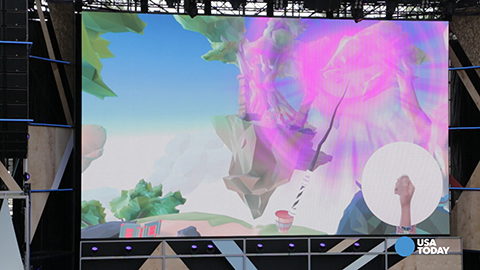Oculus developers welcome Google as space heats up

SAN JOSE - If Dana Jan seems giddy, the reasons are all around him.
Walk down developer's alley here at Oculus Connect, the third annual gathering of virtual reality magicians that opened Wednesday, and you spot countless examples of how the technology promises to blow our minds.
"A lot of us always dreamed about this moment, but now it's really here," says Dana Jan, design director of Irvine, Calif-based Ready at Dawn studios, which will unveil a new Oculus adventure Thursday. "There were stops and starts, but we're finally seeing a healthy ecosystem develop."
That ecosystem grew this week with Google's unveiling of Daydream, a smartphone-based VR platform that will run on the company's new Pixel phones. The Daydream headset will cost $79 and features a hand controller.
Thursday's focus here is expected to be on Oculus Touch, a pair of hand controllers for the high-end VR device.
Oculus developers have long had the option of developing games and experiences for mobile thanks to Samsung GearVR, a $99 headset powered by Oculus technology. Many gathered here say they welcome any efforts that will bring more consumers into the VR fold.
"You have to experience it to understand what it's all about," says Ready at Dawn's Garret Foster. "Plus you have the advantage of not being tethered."
Oculus Rift, which Facebook bought for $2 billion in 2014, is a $600 headset that is tethered by cables to a powerful computer. Facebook founder Mark Zuckerberg has said that VR will offer the world a new way to interact live via avatars. Some of the developers here are working on just such a mission.
Eric Nofsinger, chief creative officer at High Voltage of Hoffman Estates, Ill., says that while his company prefers to focus on developing for the sophisticated Oculus Rift, he is "very excited that big tech players like Google want to make VR work. We are still in our infancy, but I do think this holiday season is going to be interesting."
Nofsinger was among a variety of developers who brushed off the recent revelation that 24-year-old Oculus founder Palmer Luckey had donated $10,000 to a conservative group aiming to buttress Republican candidate Donald Trump. A few developers vowed to stop working on Oculus games unless Luckey was fired by Zuckerberg.
"Whatever people do on their own time is their business," he says. "Oculus have been great partners to us, providing hardware and support."
Admittedly, the developer area was flooded with Oculus employees. And anyone really wishing to take a stand likely would have bowed out of the three-day conference, which in fact has doubled in size over last year to 2,500 attendees.
Dutch developer Martin de Ronde, creative director at Force Field, adds that if he made "business decisions based on the political beliefs of partners things would get difficult fast."
He relates the story of a colleague who opted not to drink Coca-Cola in order to protest U.S. foreign policies. "I said to him, 'That's fine, but you're working in (Microsoft) Windows,' so where do you draw the line?"
VR promises to be a lucrative space for those who gain an early foothold. By 2020, VR is expected to be a $30 billion market, according to industry advisors Digi-Capital. Compelling content is viewed as key to that prediction.
Many developers feel that while the VR experience with devices such as Oculus - or rivals HTC Vive and forthcoming Sony PlaystationVR - represents the apex of the immersive art, giving consumers access to even a rudimentary experience via mobile is critical to broader adoption and, ultimately, the platform's success.
"Even though the fidelity isn't that great, what's nice about playing a game in GearVR is how quickly you can get into it, because it's on your phone and you just pop that in the goggle and go," says Jessa Brezinski, product manager with Harmonix Music Systems in Cambridge, Mass.
Some here predict that eventually there won't be as huge a gap in both quality and price between tethered and mobile VR options.
"Right now there's this fragmentation, but eventually things will merge and the technology will become ubiquitous," predicts Craig Bentick, an Australian developer who teamed up with friends to work on a new title for Oculus. "Just look at what's happened in five years alone and you get an idea of where it may go next."
Where it may well go next is AR, or augmented reality - sometimes also called mixed reality, which uses sophisticated projection headgear to overlap holograms onto the real world. Microsoft's developer-only device HoloLens headset in fact features a video game in which the player battles monsters that hide behind the real furniture in the room.
"We've gone from 2D images in video games to a very real VR experience, but I think the next step is AR," says developer De Ronde. "Imagine playing a game that interacts with your real world, that's got to be the ultimate."
Follow Paste BN tech reporter Marco della Cava @marcodellacava.